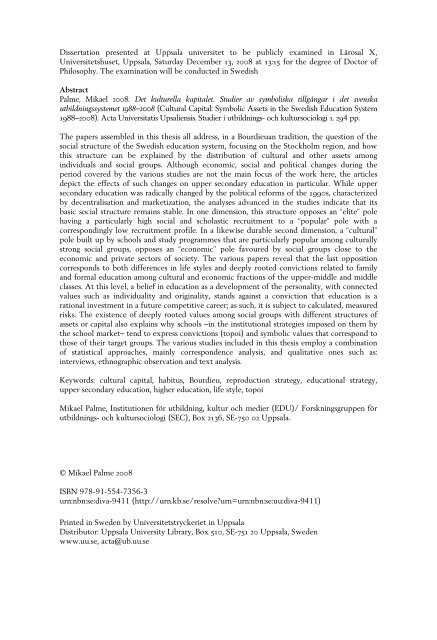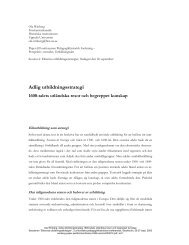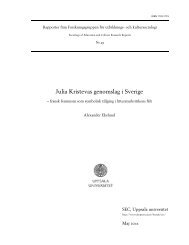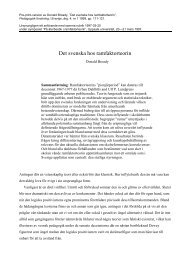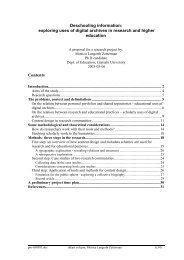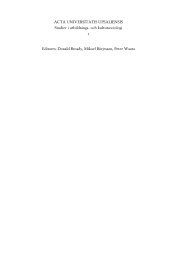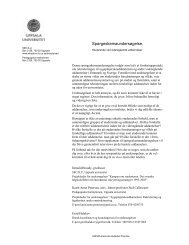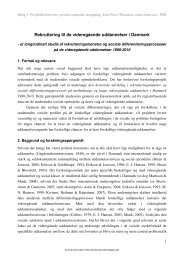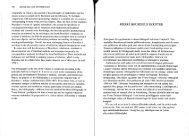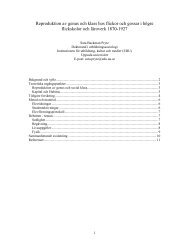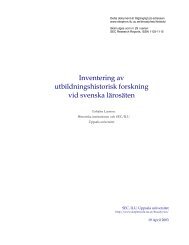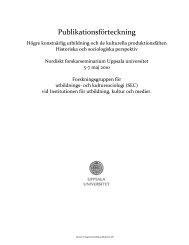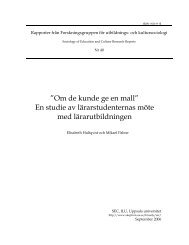PDF-version - skeptron.uu.se - Uppsala universitet
PDF-version - skeptron.uu.se - Uppsala universitet
PDF-version - skeptron.uu.se - Uppsala universitet
Create successful ePaper yourself
Turn your PDF publications into a flip-book with our unique Google optimized e-Paper software.
Dis<strong>se</strong>rtation pre<strong>se</strong>nted at <strong>Uppsala</strong> <strong>universitet</strong> to be publicly examined in Lärosal X,Universitetshu<strong>se</strong>t, <strong>Uppsala</strong>, Saturday December 13, 2008 at 13:15 for the degree of Doctor ofPhilosophy. The examination will be conducted in SwedishAbstractPalme, Mikael 2008. Det kulturella kapitalet. Studier av symboliska tillgångar i det svenskautbildningssystemet 1988–2008 (Cultural Capital: Symbolic As<strong>se</strong>ts in the Swedish Education System1988–2008). Acta Universitatis Upsaliensis. Studier i utbildnings- och kultursociologi 1. 294 pp.The papers as<strong>se</strong>mbled in this thesis all address, in a Bourdieuan tradition, the question of thesocial structure of the Swedish education system, focusing on the Stockholm region, and howthis structure can be explained by the distribution of cultural and other as<strong>se</strong>ts amongindividuals and social groups. Although economic, social and political changes during theperiod covered by the various studies are not the main focus of the work here, the articlesdepict the effects of such changes on upper <strong>se</strong>condary education in particular. While upper<strong>se</strong>condary education was radically changed by the political reforms of the 1990s, characterizedby decentralisation and marketization, the analy<strong>se</strong>s advanced in the studies indicate that itsbasic social structure remains stable. In one dimension, this structure oppo<strong>se</strong>s an “elite” polehaving a particularly high social and scholastic recruitment to a “popular” pole with acorrespondingly low recruitment profile. In a likewi<strong>se</strong> durable <strong>se</strong>cond dimension, a “cultural”pole built up by schools and study programmes that are particularly popular among culturallystrong social groups, oppo<strong>se</strong>s an “economic” pole favoured by social groups clo<strong>se</strong> to theeconomic and private <strong>se</strong>ctors of society. The various papers reveal that the last oppositioncorresponds to both differences in life styles and deeply rooted convictions related to familyand formal education among cultural and economic fractions of the upper-middle and middleclas<strong>se</strong>s. At this level, a belief in education as a development of the personality, with connectedvalues such as individuality and originality, stands against a conviction that education is arational investment in a future competitive career; as such, it is subject to calculated, measuredrisks. The existence of deeply rooted values among social groups with different structures ofas<strong>se</strong>ts or capital also explains why schools –in the institutional strategies impo<strong>se</strong>d on them bythe school market– tend to express convictions (topoi) and symbolic values that correspond totho<strong>se</strong> of their target groups. The various studies included in this thesis employ a combinationof statistical approaches, mainly correspondence analysis, and qualitative ones such as:interviews, ethnographic ob<strong>se</strong>rvation and text analysis.Keywords: cultural capital, habitus, Bourdieu, reproduction strategy, educational strategy,upper <strong>se</strong>condary education, higher education, life style, topoiMikael Palme, Institutionen för utbildning, kultur och medier (EDU)/ Forskningsgruppen förutbildnings- och kultursociologi (SEC), Box 2136, SE-750 02 <strong>Uppsala</strong>.© Mikael Palme 2008ISBN 978-91-554-7356-3urn:nbn:<strong>se</strong>:diva-9411 (http://urn.kb.<strong>se</strong>/resolve?urn=urn:nbn:<strong>se</strong>:<strong>uu</strong>:diva-9411)Printed in Sweden by Universitetstryckeriet in <strong>Uppsala</strong>Distributor: <strong>Uppsala</strong> University Library, Box 510, SE-751 20 <strong>Uppsala</strong>, Swedenwww.<strong>uu</strong>.<strong>se</strong>, acta@ub.<strong>uu</strong>.<strong>se</strong>


